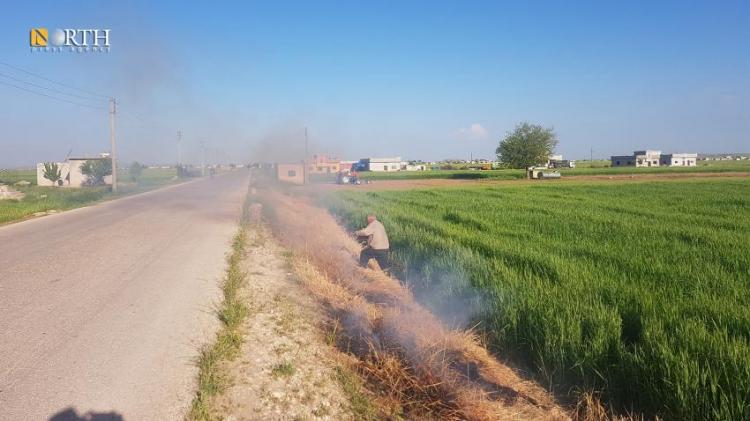Kobani – North-Press Agency
Fattah Issa – Fayad Muhammad
Farmers in the countryside of the city of Kobani, northeast of Aleppo, observe their crops and wait for the harvest time amid fears of a repeat of what happened last year, as their crops were set on fire, calling on the Agricultural Directorate and the responsible authorities in the Euphrates region to take the necessary measures and preparations to prevent the recurrence of those fires with the approaching of the date of harvest.
Mahmoud Mustafa, a 65-year-old farmer from the village of Dihaban, east of Kobani, said that the Agriculture Directorate in Kobani had not sprayed pesticides on the weeds in the eastern villages so far, “as they accelerated crop fires last year."
Mustafa, who lost about 17 hectares of his crop in the village of Dihaban last year as a result of the fires, pointed out that the farmers of Kobani countryside cultivated their lands this year despite Turkish threats to invade the Kobani region.
Mustafa noted the importance of organizing the work of harvesters in order not to repeat the problem of last year, as "most of the harvesters went to the Jazira region to work, while very few numbers remained in the Kobani region."
Muhammad Barkel, a 59-year-old farmer from Kobani, said that he incurred the cost of spraying herbicides on the road near his land about ten days ago, pointing out that "the Agricultural Directorate was supposed to spray pesticides or provide them to the farmers to be sprayed."
Barkel assures that the Directorate of Agriculture did not spray pesticides in the villages of Muktala, Dihaban, Shaheenk, and Sharran, where most of the farmers of these villages brought pesticides at their own expense.
About two weeks ago, the Agricultural Directorate in Kobani, in coordination with the Economic Commission in the Euphrates region, sprayed the Kobani – Jalabiya, Kobani – Sirrin, Kobani – Qanaya, and Kobani – al-Shuyukh roads with pesticides, Fahd Abbas, the administrator at the Directorate of Agriculture in Kobani told North-Press.
The total agricultural areas burned by fire in the Kobani region during the 2019 season reached 2,816 acres, 544 of which were planted with wheat and 2,272 with barley. In addition, 17,989 trees were burned, most of them olive and pistachio trees, as well as around seven and a half acres planted with lentils, according to a previous statement by the spokesman for the Economy Committee of the Kobani region Khalil Sheikh Muslim.
Based on the statement issued by the Economic and Agriculture Commission on the 30th of September last year, the Autonomous Administration of North and East Syria compensated farmers who were affected by the burning of their crops by providing them with free seeds.

